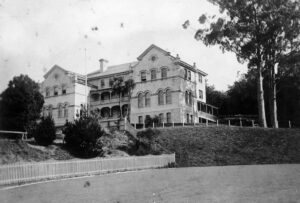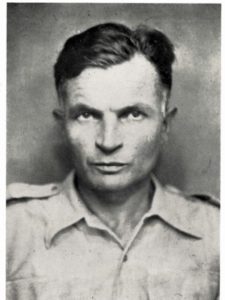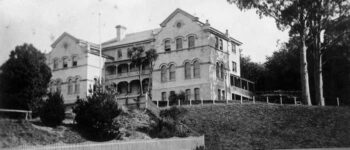1864: Charlie’s First Day at Boarding School
August 15, 2022
By AHNZ

“Listen, if you break one of the rules or regulations of this school I’ll thrash you.” said the schoolmaster. The cane used for said thrashing was tucked under his arm ready for use on any children who should dare to ‘talk back’. “Go to your seat.”
These were the first words said to the schools most recent pupil, Charlie Hovell. I estimate this to have been October 1864 a little into the school’s forth quarter (term) so the boy, Charlie, would have been about 9 years old. It was a central Auckland school, probably Wesley College at Upper Queen Street where Auckland Girl’s Grammar can now be found. In this case, it was Principal John Fletcher who was about to be laid out by a kid…
“You speak to me, sir, in a respectable manner and I’ll go to my seat. I’m not a dog to be ordered,” offered the young Hovell in reply. The assembled school watched on to see what would happen next.
Fletcher drew his cane to strike out. At once, young Charlie (the single source of this story, by the way,) delivered a blow to the principal’s jaw and another to the solar plexis! Decked to the floor, the accademic instructor’s ear now became a football for Charlie’s kicking foot.
To the headmaster’s rescue came Wilson, a very tall boy, to restrain Charlie. Instead, Wilson met with a Colonial Kung Fu flip and Charlie put him down on the floor too. Now the entire school fell upon the new entrant and removed his dangerous boots. By the time Charlie had been restrained and locked up in school jail he had sent two more assailants falling down the stairs.
The Great Escape

Little Charlie Hovell first came to New Zealand at the age of 6 with his family in 1862 at the port of Auckland. One of his first acts of induction was to have been adopted into one of the rival kid gangs of Auckland and made a jockey in a goat race on account of his being small and light. The race ran off the tracks, upsetting the Maori street markets. Fortunately the ring-leader, Prime Minister Frederick Whitaker’s son, used his family lawyering skills to deescalate the strife.
From here on Charlie’s life continued to be full of daring adventures that paid little reguard or empathy to the adults unlucky enough to get in the way of them. This was the generation growing up during the Moral Culture time period of Branigan Honor Culture. He was part of a new New Zealand generation groomed to be tough. It was the time of the gold rush, kauri gum, and the Maori Wars. Charlie had already been expelled from 2 or 3 schools at this point so his father, Doctor Hovell, resorted to sending his son to boarding school in town.
Charlie was so unruly that he had disobeyed his father at Rangiriri by moving closer to the battle for a better look and actually wound up getting shot in the leg by a Maori bullet! He had been expelled by one school for ‘justly’ clobbering another child on the head with a hunk of slate. Next, for making a pepper-spray booby-trap in a flower bouquet that incapacitated his teacher. Next expulsion was over his biting his teacher in the groin. Another time he paid back an orchardist he had thieved from for reporting him by setting 3 hives of angry bees on the man and his wife. Charlie was an Honour Culture kid running wild and that’s the way he liked it.
 So, it would take a lot more than being locked in a room by the Wesleyians to reform this kid. Using the old tried and true method of bed-sheet-rope, he escaped what must have been a room on the second floor of the school building (It may have been St Matthews or St Johns or St Marys but I’m picking Wesley College, image left.) Charlie also used a conveninet grape vine to climb down but it didn’t hold and he took it with him crashing to the ground. Having pilfered some of the ripe grapes, he stopped the rest into the ground as revenge against the vine for betraying him as well as the school for treating him so poorly.
So, it would take a lot more than being locked in a room by the Wesleyians to reform this kid. Using the old tried and true method of bed-sheet-rope, he escaped what must have been a room on the second floor of the school building (It may have been St Matthews or St Johns or St Marys but I’m picking Wesley College, image left.) Charlie also used a conveninet grape vine to climb down but it didn’t hold and he took it with him crashing to the ground. Having pilfered some of the ripe grapes, he stopped the rest into the ground as revenge against the vine for betraying him as well as the school for treating him so poorly.
Young Hovell proceeded down Queen Street to the warves to where his life in New Zealand all began. With his pockets full of grapes he waited 2 days and 2 nights watching the ships to pick out the best one to stowaway on. In big trouble now, Charlie needed to get away from the school and his father and avoid the serious consequences brewing. He wasn’t sure the school master whose head he had kicked wasn’t dead.
On 29 October, 1864, Captain Abraham Reynolds departed Auckland on the clipper ship Ida Zeigler. At sea, the next day, 600 miles later, young Charlie Hovell was discovered hiding in the sails. There was no going back, therefore the kid was put to work and taken on a world tour. Finally, under Captain Reynolds, little Charlie had a teacher he could respect and who would discipline him with respect.
“A very well-known vessel which brought many early New Zealanders to these shores was the ship Ida Zeigler, which for seven years was commanded by Captain Abraham L. Reynolds, and on the last voyage by Captain Sellars. Captain Abraham L. Reynolds had the reputation of carrying on when he had a chance, but he was popular with his passengers. In 1864 Lady Wynyard (wife of Governor Wynyard), with her family, were passengers to England in the “Ida.”” – White Wings Vol I. Fifty Years Of Sail In The New Zealand Trade, 1850 TO 1900, NZ Electronic Texts
“I was pealing spuds and up aloft and everything…having the time of me life. We got to America, to New York, with kauri gum and stuff and discharged,…to London. Old Captain Reynolds gave me 2 sovereigns then…around the north of Scotland…London…sailed for New Zealand again.” – Oral History of Charlie Hovell, 1YA (1948;) NZ Sound and Vision
“IYA will broadcast the history of Coromandel. Mr Charles Woodward Hovell, J.P., will relate incidents of interest of as far back as 1872. The speaker, as a youth, served with his father, the late Colonel Dr. Charles Hovell, in the Maori Wars, and the speaker, who is still hale and hearty at 93 years of age, will deal with his many experiences during his life in Coromandel—experiences which helped in making the history of a once famous town.” – HISTORY OF COROMANDEL, IYA TO BROADCAST, Waihi Daily Telegraph (1948;) Papers Past
On 12 October, 1865, the Ida was back in Auckland again after its fastest trip ever (85 days.) Charlie returned to his family in Howick with some of his rough edges shaved off. The Ida became a troop ship to help transport the Imperial Army away from New Zealand, leaving the colony to mop up any remaining Maori troubles.
Hovell lived to be 95 years old and to become a Justice of the Peace and a mining identity of the Coromandel. His lifespan is still longer than half of the time New Zealand has been a nation yet he died in 1952. Charlie had more grandchildren than he could count and lived more than long enough to be visited by government radio 1YA in 1948 to tell the above story. This you can listen to on NZ Sound and Vision.
 The Colonial Spirit and New Zealand vigour that animated Charlie’s life hasn’t been seen in this country for a while now. His stories about giving children head injuries for stealing all the marbles or cutting corpses into thirds to make grave digging easier shock 2020s New Zealanders. Yet other generations, the Honour Culture generations, have been and will again be impressed by how self-possessed and assertive a Kiwi can be. Also, aggressive when necessary. Men like these are repressed much of the time however we had better keep some Charlies in our population for when we need them because we always will.
The Colonial Spirit and New Zealand vigour that animated Charlie’s life hasn’t been seen in this country for a while now. His stories about giving children head injuries for stealing all the marbles or cutting corpses into thirds to make grave digging easier shock 2020s New Zealanders. Yet other generations, the Honour Culture generations, have been and will again be impressed by how self-possessed and assertive a Kiwi can be. Also, aggressive when necessary. Men like these are repressed much of the time however we had better keep some Charlies in our population for when we need them because we always will.
– –
Image ref. Another Charlie, Upham; Living Heratage
Image ref. Wessley College reincarnated as Prince Albert College, Alexander Turnbull Library, Digital NZ
Image ref. Captain Reynolds, White Wings Vol I. Fifty Years Of Sail In The New Zealand Trade, 1850 TO 1900, NZ Electronic Texts
Ref. also 1930s: Systematic Thrashings, AHNZ
Note: Hovell’s story doesn’t prove that these events occured in 1864, only thereabouts. It’s the best guess as is the school he absconded from and the voyage of the Ida he escaped on
 Like Comment Share
Like Comment Share





